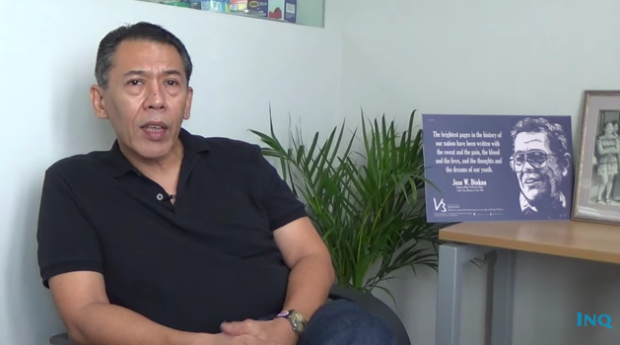After reading President Duterte’s Proclamation No. 216, human rights lawyer Jose Manuel Diokno had more questions than answers about the declaration of martial law in Mindanao.
“The way it was worded [in the proclamation], the issue is if there is an actual rebellion in Mindanao that would justify the imposition of martial law,” Diokno told the Inquirer by phone on Thursday.
According to Diokno, the proclamation states that the terrorist attack on Marawi City “shows the capability of the Maute group and other rebel groups to sow terror, and cause death and damage to property not only in Lanao del Sur but also in other parts of Mindanao.”
“They made use of the word ‘capability.’ That would mean that might happen rather than actually happening. It is clear from the constitutional deliberations that what the Constitution mean[s is] an actual invasion and rebellion taking place,” Diokno said.
Diokno also pointed out that the martial law declaration mentions attacks by the Maute group last year, as the proclamation justifies Mr. Duterte’s implementation of Proclamation No. 55, or imposing a state of national emergency, last year.
Disturbing equation
The Makabayan bloc in the House of Representatives was also perturbed that the proclamation actually equates terrorism with rebellion.
“If you read Proclamation No. 216, you will notice how the Maute terrorist group in the proclamation [is] included and ‘other rebel groups.’ The play of words from terrorists to rebel groups. There is no distinction anymore,” ACT Teacher Rep. Antonio Tinio said.
This is what makes Proclamation No. 216 “very dangerous,” Tinio added.
“What does this mean in President Duterte’s proclamation? That he does not recognize the armed rebellion in Mindanao and everywhere that is rooted in deep social, economic and political problems? You call them terrorists. It means the only solution is purely a military approach, hence, martial law,” Tinio said.
The Communist Party of the Philippines, and its armed wing, the New People’s Army, have been labeled as a terrorist group by the United States more than 10 years ago.
The Makabayan bloc warned against Mr. Duterte’s use of the terrorism threat in justifying martial law.
Be careful
Tinio urged the public and the media to be “careful and critical in using terrorism as a justification for martial law.”
He lamented that Filipinos appear not to have learned from history.
“Marcos used the Plaza Miranda bombing as a justification for the suspension of the [privilege of the] writ of habeas corpus. Eventually in (Marcos’) martial law declaration, the threat of Muslim secessionism in Mindanao and the communists were cited,” Tinio said.
Human rights groups fear that martial law powers could further embolden Mr. Duterte, whom they have accused of allowing extrajudicial killings of thousands of people in his crackdown on illegal drugs.
The National Union of Peoples’ Lawyers, a group of human rights attorneys, called it “a sledgehammer, knee-jerk reaction” that would “open the flood gates for unbridled human rights violations.”—WITH A REPORT FROM THE WIRES
